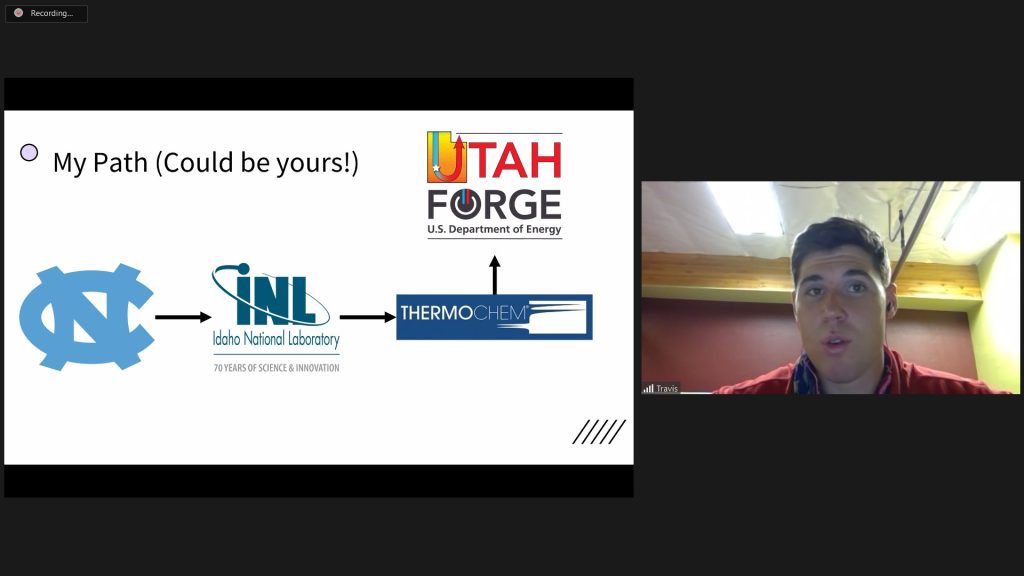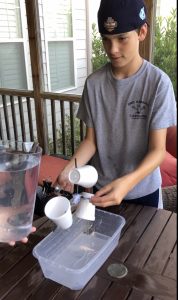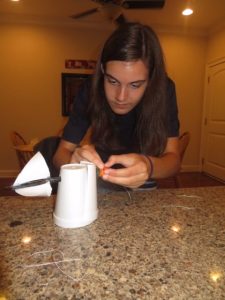Energy LEAP summer program still meaningful during time of social distancing
October 4, 2020
Each summer, IE’s Center for Public Engagement with Science (CPES) hosts a week-long camp for high school students interested in science. Amid the global pandemic, Energy LEAP (Literacy, Engagement and Action Program) was held remotely this summer during the last week of July and Grant Parkins, program director, along with several staff, modified the camp to make it meaningful during a time of social distancing. CPES partners with UNC’s Department of Physics and Astronomy to provide this opportunity.
While the energy camp is usually based in Phillips Hall on UNC’s campus, this year the program consisted of a daily 1.5-2 hour Zoom instruction period followed by hands-on activities and experiments with materials provided by the CPES. Guest speakers also explained their passions, education and career paths to inspire future scientists.
 To avoid only lecturing, students had activities and homework assignments after meeting together. This participant created energy with hydropower.
To avoid only lecturing, students had activities and homework assignments after meeting together. This participant created energy with hydropower.One of the perks of having the camp virtually was more flexibility with the number of participants. This year there were 23 participants from Alamance, Chatham, Durham and Orange counties. Science teachers in these counties are notified about this camp and are asked to specifically encourage underrepresented students to apply.
Parkins said the program encourages women and those from minority groups to apply to make science careers feel more accessible for everyone and to inspire those who may not have been drawn to science to see it as a viable career path.
“I think we need the best and the brightest in the STEM fields,” Parkins said. “And I feel like the best and the brightest from underrepresented groups are not necessarily being drawn to STEM fields.”
Another way the camp is accessible to students is that it is free of cost. The camp is funded by the Duke Energy Foundation and the UNC Institute for the Environment.
Hailey Galit, a rising junior at UNC, helped to run a lot of logistics and activities for the camp.
Coming up with trivia questions and a scavenger hunt were some of the ways Galit helped make energy types understandable and tangible for students.
“It is a great opportunity for high schoolers to have a stake in how energy is created and brought to them, and the different ways we can do it more sustainably in the future,” Galit said.
Galit also helped organize with some guest speakers including UNC graduate Travis Broadhurst. Broadhurst studied geology, physics and chemistry at UNC and now works as a Field Chemist for a consulting firm called ThermoChem. He shared about geothermal energy, gave a virtual tour of the largest geothermal plant in the world (Geysers Geothermal Complex outside San Francisco) and detailed how he propelled himself to his position.
Alton Gayton, a recent graduate from the biochemistry program at UNC also gave a talk about nuclear energy.
“With the state of the planet I think it is important to plant the seeds of understanding that renewable energy is the future,” Galit said. “ I think high school is the perfect time to do that.”
 More hands-on at-home activities.
More hands-on at-home activities.To avoid only lecturing, students had activities and homework assignments after meeting together. One of their tasks was to find the most efficient way to charge solar batteries in their homes. These batteries were provided to students by the camp and were gifts to keep. Parkins said the goal of the assignment was to creatively problem-solve and set up their own experiment.
“We thought we could still provide value to students,” Parkins said of choosing to still run the camp. “I hope this camp is a way to reignite students’ imaginations, creativity and enthusiasm for learning.”
Story by Ava Eucker ’21
Ava Eucker is an undergraduate student at the Hussman School of Journalism and Media concentrating on reporting. She is minoring in Spanish and plans to center her career path around travel, storytelling and focusing on environmental work. Eucker will be taking a semester to work on an organic farm in Hawaii and will study abroad in Quito, Ecuador before finishing her degree by December 2021.
